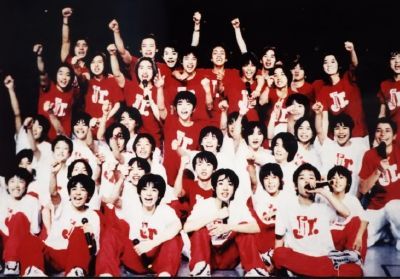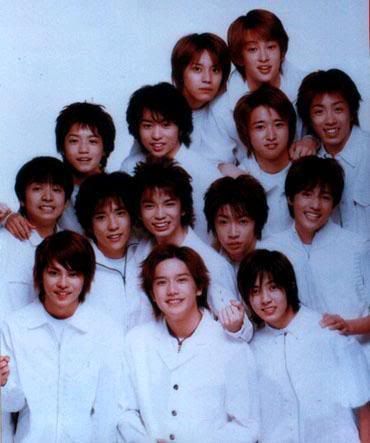Part 3 - The Golden Age - the debate
Hello! Welcome to part 3 of johnny's post history! This part describes the "Golden Age", which is also sometimes called "The Golden Age of the juniors." It is a continuation of part 2, is a union between the 2 and 4, the next thing you focus on what I call the "Group of the Golden Age" or & ldquo , The Boys in the Age of Gold & rds "of the Golden Age (during the years at the top) are: Hideaki Takizawa, Tsubasa Imai, members of Arashi, Kanjani8 most (except Uchi or Ohkura), Musical Academy (well, future MA, Akiyama June was quite popular), Kohara Yuki, Tomohisa Yamashita and Ikuta Toma. They are what I like to call "
the first generation of kids gold." After Arashi's debut and some juniors started to leave (yes, Yuki, I'm looking at you), the juniors who entered during the height of the Golden Age replaced them, and that's when KAT-TUN members, Hasegawa Jun, Jimmy Makey and began to be important Uchis. I call them "
the second generation of
golden boys." During the Kansai disregard for future members of NEWS and some of the junior groups of the New Age
(ABC, Ya-ya-yah, etc.) began to appear, and that is why we have kids in the Gold was mixed with new age kids now! But they are not my focus, haha! I think
 The Golden Age is important because it took a bit of focus to the group debuted and gave it to the juniors. Daisempais Subsequent groups had been dissolved when it was 96 (Ninja, Hikage), Kinki had not yet debuted, andyou, to be moved back to Osaka, and we hear stories about how Yoko took a construction job to support themselves because their work as idol was almost nil, Ryo talks about how he wanted to leave the agency during that time because she felt miserable, and Subaru went a little crazy and did what the fans call Kanjani gently "Skull-chan
The Golden Age is important because it took a bit of focus to the group debuted and gave it to the juniors. Daisempais Subsequent groups had been dissolved when it was 96 (Ninja, Hikage), Kinki had not yet debuted, andyou, to be moved back to Osaka, and we hear stories about how Yoko took a construction job to support themselves because their work as idol was almost nil, Ryo talks about how he wanted to leave the agency during that time because she felt miserable, and Subaru went a little crazy and did what the fans call Kanjani gently "Skull-chan "
(skull-chan)
. (Skull-chan is a constant reminder of that era, and in many photoshoots later one can see that Subaru's right hand is deliberately hidden or covered by a glove / mitten / whatever)
Yet Therefore, the tim kansai juniorsesaron in the summer of 2002 with the play "Another." Brought new popularity to the kansai juniors, and it seems that management gave them more projects and jobs. However, rather than return to Tokyo to work with the juniors in Tokyo as they did during the early years of the golden era, its activities were concentrated in the Kansai area. At least I think that aspect is only one of its golden age - that is, playing with the style of kansai juniors there. His outrageous style, his humor, his eccentricities .... that sort of thing. Just kansai juniors while experiencing its renaissance, T & T debutban a couple of months later. Yuki left him in 2000, Subaru and Yoko were part of "contempt for kansai" in 2001, and Takki debuted in 2002, all the leaders of the golden age (and arashi) were out of the box juniors for 2000, and even Yamapi went in 2003 with the debut of news (which meant making babies and the gold was headed toward the same "darkness" that passed the junior ma ; s sempais as MA). Kanjani debuted in 2004, making them the last game to make its debut kansai mixtures. KAT-TUN became the group leader of the juniors after the debut of Nacute; youths from sempais groups, but even join at the same time, are defined by their participation in the golden era. Thus, the juniors before the era of gold are known for not just children of the age of gold and the juniors after the golden era are set apart because it debuted with kids from the age of gold.
So the same way that separates SMAP daisempais of sempais, the golden era defined the line between sempais and later. (That is, not acting as Arashi version of spam in the golden age (aunq in a way they are) because it was not his fault it was only a new era, in fact, that title pertmore appropriately ENECE Takki).
end I think it was pretty weak, but I can not think of a better conclusion. Sorry, lol.
In short, the juniors of the golden era, starting in 1996, which was Arashi, Kanjani 8 (without Ohkura), T & T and KAT-TUN were juniors together and shaped an era and a way to see the juniors of the Johnnys Jimusho. They were all healthy and happy a small group but the years passed, the first Arashi debuted in 2000, then T & T in 2002, began the period of contempt kansai, 4 tops became the leaders of the juniors, and so ended the golden age. Then the boys qis my humble opinion, the juniors of this time during his pre-debut, were far more famous than the juniors of today have many more s work and more experience before debuting that are debuting lately, or that some of the new juniors are today, and in general, one can say that made a difference and they can not compare to the juniors of any prior or subsequent time. They
 programs such as Ai Love Jr, apart from Shounen Club or at the time called Jump Music, or Gakibara, Hadaka no Shounen or Japan or use .... Some ten & iacu
programs such as Ai Love Jr, apart from Shounen Club or at the time called Jump Music, or Gakibara, Hadaka no Shounen or Japan or use .... Some ten & iacu
0 comments:
Post a Comment